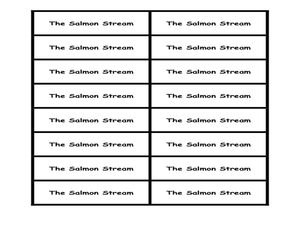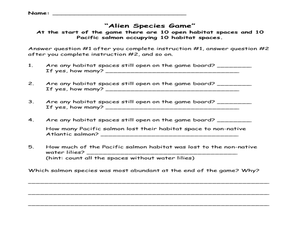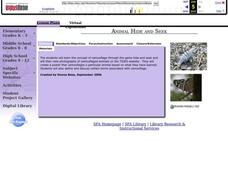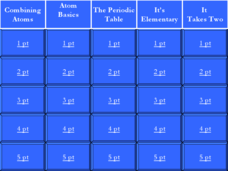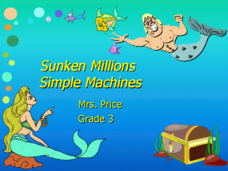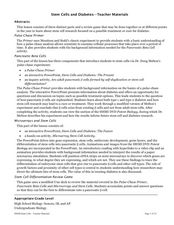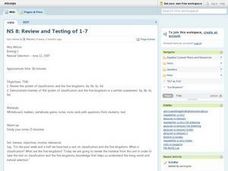Curated OER
Inside/Outside the Human Genome
Students combine a jigsaw learning technique with an inside/outside review game to learn about genes and the Human Genome Project. Students will describe DNA, genes and chromosomes.
Curated OER
The Salmon Stream and Vegetation
Students explore the ecosystem and food chain by researching Pacific Salmon. In this fish habitat lesson, students discover the life cycle for salmon, where they spawn and what they eat to survive the harsh elements. Students participate...
Curated OER
Salmon and the Non-Native Species
Students investigate the affect of non-native species on Pacific Salmon. In this non-native species and Pacific Salmon lesson plan, students participate in a competition and habitat loss game. They play the game in groups, while...
Curated OER
Cell Cycle, Mitosis and Meiosis
Seventh graders describe the processes involved in mitosis and meiosis. In this life science lesson, 7th graders create chromosome models using strings and beads. They play a jeopardy team game at the end of the unit to review concepts...
Curated OER
the Journey of the Pacific Salmon in the Open Ocean and Fishing
Third graders discuss salmon and their life cycle. In this salmon life cycle lesson, 3rd graders recognize the difficulties researching the life cycle of salmon as they migrate. Students conduct an experiment and create a game.
Curated OER
TIDES
Second graders are taught the concept of camouflage through the game hide and seek. They view photographs of camouflaged animals on the TIDES website. Students create a poster that camouflages a particular animal based on what they have...
Curated OER
Jeopardy
Students participate in games to review subject matter. They drill on vocabulary and/or spelling words. Students connect pertinent facts with dates. They perform activities as a group review before a test.
Curated OER
Colorful Corn Ring Toss
Students design and construct a ring-toss game that enables them to practice spelling words, math facts, or science vocabulary. They plan and determine their game rules, and using a variety of craft materials, create a corn-husk/corn-ear...
Curated OER
Who Wants to Be a Millionaire?
What a great way to review information your class has learned about recycling and the environment! Learners can play the game Who Wants to Be a Millionaire to reinforce information they have learned about the earth and the environment.
Curated OER
Human Impact Starts with?
What kind of effects do humans have on their environment? Review key anthropogenic vocabulary with a fill-in-the-blank handout. You may wish to use this as an ongoing glossary, review before a test, or even create a crossword puzzle or...
Curated OER
Breathing
When learning about the respiratory system, how do learners know what is important? One way is to use a self-assessment or study like the one found here. While the formatting could use some work, the concepts are solid. Depending on your...
Curated OER
How Substances Get in and out of Cells
Although it contains some formatting issues, the Word document here contains good questions about osmosis and diffusion, and is easy to edit as needed. Designed as a study guide, you could use the information here for warmups, ideas for...
Polar Trec
Arctic Smorgasbord!
Two blooms of phytoplankton, instead of just one, now occur in the Arctic due to declining sea ice, which will have widespread effects on the marine life and climate. In small groups, participants build an Arctic food web with given...
Lerner Publishing
Living or Nonliving
It's alive! Or is it? Through a series of shared readings, whole class activities, and independent exercises children explore the difference between living and non-living things, creating a pair of printable books to demonstrate their...
Center for Learning in Action
Introducing Physical and Chemical Changes
Young scientists investigate chemical and physical changes to the states of matter—gas, liquid, and solid—as well as solutions and suspensions with a variety of demonstrations, grand conversation, and an interactive quiz to check for...
Curated OER
Spill Your Guts
Young scholars practice nutrition facts. In this health and nutrition lesson plan, students participate in a game in which two teams compete to "spill their guts" by quickly answering factual questions pertaining to nutrition. This...
Curated OER
Sunken Millions Simple Machines
This PowerPoint includes a quiz show game in which two teams compete for points received by answering questions about simple machines. The content reviewed includes the types of simple machines, identifying examples of simple machines...
Howard Hughes Medical Institute
Stem Cells and Diabetes
Students investigate stem cells. In this science lesson, students discuss stem cells and view a video about human embryonic development. Students conduct the pulse-chase.
Curated OER
Academic Raceway Ecosystems and Biomes
This ecology PowerPoint allows students to review the characteristics of each biome. There are real photographs to go along with each description of the specific biome. There is a vocabulary slide which also introduces key terms.
Curated OER
Review And Testing
Students engage in a instructional activity in order to review some of the basic concepts of kingdoms and classification. They use research methods in order to find some of the information initially an use the notes to review for the...
Curated OER
Cell Reviews
High schoolers draw cells, make a cell, and list organelles in plant and animal cells. In this cells lesson plan, students create edible cells.
Curated OER
Games for Culminating Activity
Students need to be creative in developing an activity that will help other students review the information studied in the past four weeks. They will work effectively in groups to develop a culminating activity and to play other groups'...
Curated OER
Jeopardy Game
Students review terms that relate to ships and shipping to be prepared for a trip to a ship building company. They demonstrate how many terms, and their meanings, the students remember from the presentation earlier in the week.
Curated OER
Memory Game
Students create cards for a memory game by entering data into a spreadsheet that is then merged into a word processing document. Tutorials are available through links on the lesson page.



